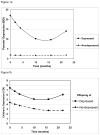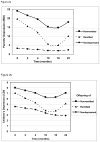Remission of depression in parents: links to healthy functioning in their children
- PMID: 21291439
- PMCID: PMC3059224
- DOI: 10.1111/j.1467-8624.2010.01552.x
Remission of depression in parents: links to healthy functioning in their children
Abstract
This study examined whether improvement in parents' depression was linked with changes in their children's depressive symptoms and functioning. Participants were 223 parents and children ranging in age from 7 to 17 years old (M = 12.13, SD =2.31); 126 parents were in treatment for depression and 97 parents were nondepressed. Children were evaluated 6 times over 2 years. Changes in parents' depressive symptoms predicted changes in children's depressive symptoms over and above the effect of time; children's symptoms significantly predicted parents' symptoms. Trajectories of children's depressive symptoms differed significantly for children of remitted versus nonremitted depressed parents, and these differences were significantly predicted by their parents' level of depression. The relation between parents' and children's depressive symptoms was partially mediated by parental acceptance.
© 2011 The Authors. Child Development © 2011 Society for Research in Child Development, Inc.
Figures




References
-
- Alpern L, Lyons-Ruth K. Preschool children at social risk: Chronicity and timing of maternal depression symptoms at school and at home. Development and Psychopathology. 1993;5:371–387.
-
- American Psychiatric Association. Diagnostic and statistical manual of mental disorders. 4. Washington, DC: Author; 1994.
-
- Barber BK. Parental psychological control: Revisiting a neglected construct. Child Development. 1996;67:3296–3319. - PubMed
-
- Barber BK, Stolz HE, Olsen JA. Parental support, psychological control, and behavioral control: Assessing relevance across time, method, and culture. Monographs of the Society for Research in Child Development. 2005;70(4) - PubMed
-
- Baron RM, Kenny DA. The moderator-mediator variable distinction in social psychological research: conceptual, strategic, and statistical considerations. Journal of Personality and Social Psychology. 1986;51:1173–1182. - PubMed
Publication types
MeSH terms
Substances
Grants and funding
LinkOut - more resources
Full Text Sources
Medical

